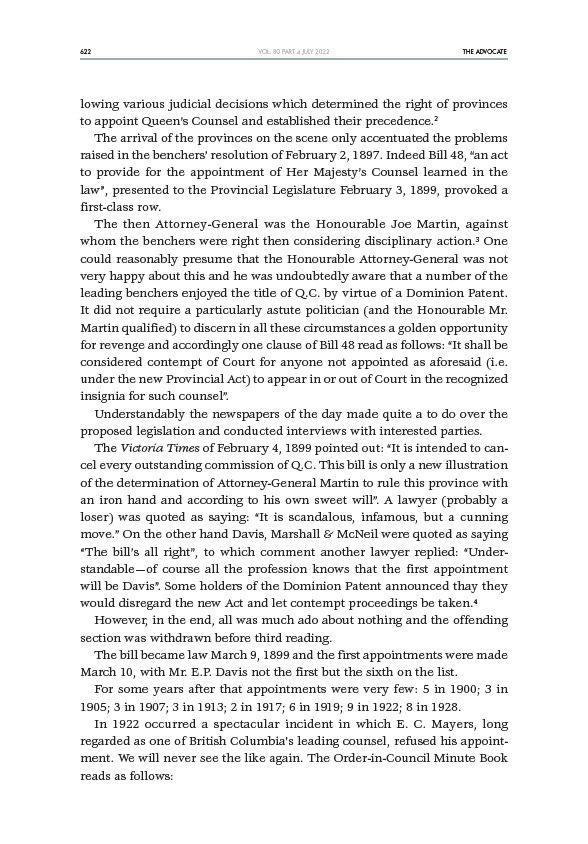
622 THE ADVOCATE
VOL. 80 PART 4 JULY 2022
lowing various judicial decisions which determined the right of provinces
to appoint Queen’s Counsel and established their precedence.2
The arrival of the provinces on the scene only accentuated the problems
raised in the benchers’ resolution of February 2, 1897. Indeed Bill 48, “an act
to provide for the appointment of Her Majesty’s Counsel learned in the
law”, presented to the Provincial Legislature February 3, 1899, provoked a
first-class row.
The then Attorney-General was the Honourable Joe Martin, against
whom the benchers were right then considering disciplinary action.3 One
could reasonably presume that the Honourable Attorney-General was not
very happy about this and he was undoubtedly aware that a number of the
leading benchers enjoyed the title of Q.C. by virtue of a Dominion Patent.
It did not require a particularly astute politician (and the Honourable Mr.
Martin qualified) to discern in all these circumstances a golden opportunity
for revenge and accordingly one clause of Bill 48 read as follows: “It shall be
considered contempt of Court for anyone not appointed as aforesaid (i.e.
under the new Provincial Act) to appear in or out of Court in the recognized
insignia for such counsel”.
Understandably the newspapers of the day made quite a to do over the
proposed legislation and conducted interviews with interested parties.
The Victoria Times of February 4, 1899 pointed out: “It is intended to cancel
every outstanding commission of Q.C. This bill is only a new illustration
of the determination of Attorney-General Martin to rule this province with
an iron hand and according to his own sweet will”. A lawyer (probably a
loser) was quoted as saying: “It is scandalous, infamous, but a cunning
move.” On the other hand Davis, Marshall & McNeil were quoted as saying
“The bill’s all right”, to which comment another lawyer replied: “Understandable—
of course all the profession knows that the first appointment
will be Davis”. Some holders of the Dominion Patent announced thay they
would disregard the new Act and let contempt proceedings be taken.4
However, in the end, all was much ado about nothing and the offending
section was withdrawn before third reading.
The bill became law March 9, 1899 and the first appointments were made
March 10, with Mr. E.P. Davis not the first but the sixth on the list.
For some years after that appointments were very few: 5 in 1900; 3 in
1905; 3 in 1907; 3 in 1913; 2 in 1917; 6 in 1919; 9 in 1922; 8 in 1928.
In 1922 occurred a spectacular incident in which E. C. Mayers, long
regarded as one of British Columbia's leading counsel, refused his appointment.
We will never see the like again. The Order-in-Council Minute Book
reads as follows: